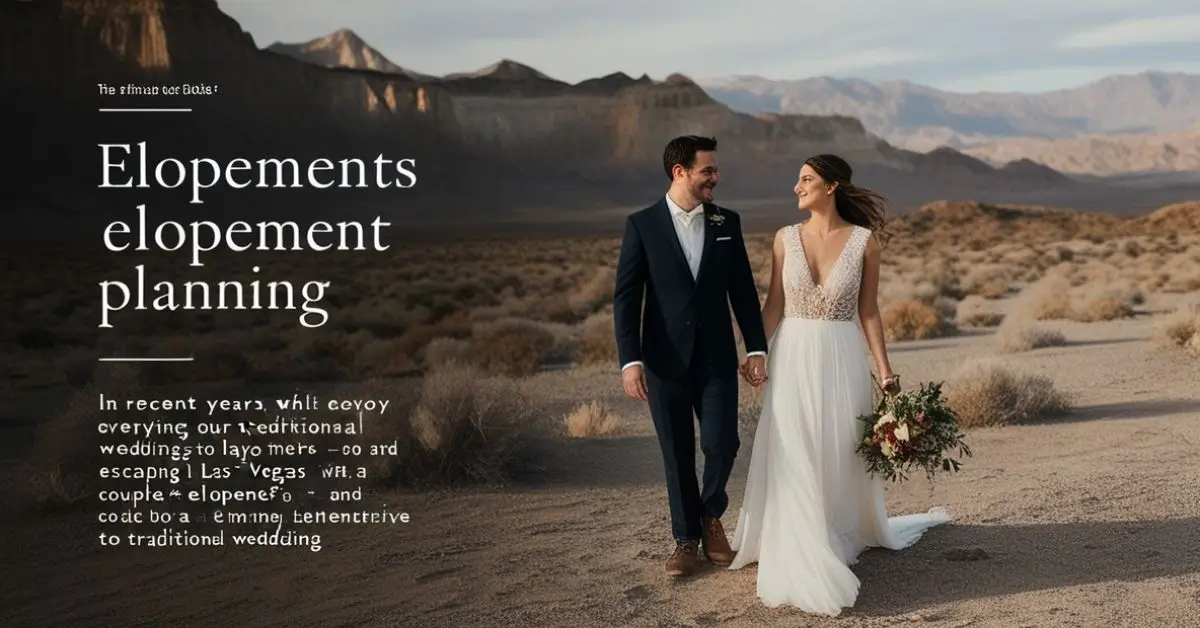How to Elope, in recent years, elopements have evolved from secret, spur-of-the-moment getaways to a popular and intentional alternative to traditional weddings. Eloping is no longer solely about escaping to Las Vegas with no witnesses; it has become a choice for couples seeking intimate, authentic, and sometimes adventurous ways to celebrate their love. This guide will explore the ins and outs of elopement planning, covering everything from its benefits to practical considerations. Whether you’re drawn to the romance of elopement or you’re looking for a stress-free wedding option, this article will help you navigate the process smoothly.
Why Elope? Benefits of Choosing an Elopement
Before diving into how to elope, it’s important to understand why couples choose this route. There are several advantages to eloping, each offering its unique appeal depending on the couple’s values and preferences.
a. Intimacy and Privacy
Elopements provide a deeply personal experience, focusing solely on the couple’s commitment to each other. With fewer guests (or none at all), eloping allows the bride and groom to connect on a much deeper level during their ceremony, without distractions. This level of intimacy can be a powerful reason to opt for an elopement, especially for couples who value privacy or feel uncomfortable with public ceremonies.
b. Cost-Effectiveness
Weddings can be incredibly expensive. The average cost of a traditional wedding in the U.S. hovers around $30,000, factoring in venues, catering, attire, decorations, and entertainment. In contrast, elopements can significantly reduce expenses, allowing couples to allocate their funds toward what matters most to them. Whether it’s investing in a meaningful experience, such as traveling or securing high-quality photography, eloping offers a budget-friendly alternative.
c. Reduced Stress
Planning a large wedding often involves months of stress and meticulous coordination. From managing guest lists and vendors to handling expectations from friends and family, weddings can quickly become overwhelming. Eloping eliminates much of this stress, as the couple can focus on what truly matters—each other. With fewer logistics to worry about, an elopement provides a laid-back atmosphere where the couple can be present and enjoy their day.
d. Adventure and Flexibility
Eloping doesn’t have to mean heading to a courthouse. Couples today choose scenic and adventurous locations such as mountaintops, beaches, forests, or national parks for their ceremonies. These unique backdrops make for unforgettable memories and incredible photos. Elopements offer the freedom to break away from the traditional mold, allowing couples to tie the knot in places that are special to them, with fewer constraints on timing and guest accommodation.
Deciding Where to Elope: Destination or Local?
One of the first steps in planning an elopement is deciding where to hold the ceremony. Whether you want to stay close to home or jet off to a far-flung destination, the location plays a major role in shaping your experience.
a. Destination Elopements
A destination elopement adds a layer of adventure and excitement to the experience. Popular elopement destinations include breathtaking landscapes like the cliffs of Santorini, the beaches of Hawaii, or the picturesque forests of the Pacific Northwest. When choosing a destination, consider the following:
- Legal requirements: Every country or state has different laws for getting married. Be sure to research the legal process in your destination to avoid last-minute complications. Some locations have waiting periods or residency requirements.
- Travel logistics: Factor in the cost and time of traveling to your chosen location. If you’re inviting a small group of close family and friends, consider whether it’s feasible for them to make the journey as well.
- Weather and seasonality: Make sure to check the weather patterns of your chosen destination, especially if it’s prone to extreme weather conditions. Eloping on a tropical beach during hurricane season, for example, may not be ideal.
b. Local Elopements
For couples who prefer a more low-key affair or have personal ties to a specific area, local elopements are a great option. They provide the convenience of staying close to home while still allowing you to create an intimate, meaningful experience. Local elopements may take place at a courthouse, a local park, or even in your backyard.
- Familiarity: Planning locally can be less stressful since you’re already familiar with the area and may already have preferred vendors in mind, such as a photographer or florist.
- Budget: A local elopement can also be more cost-effective, as you’ll save on travel expenses.
- Accessibility: If you plan on inviting a few close friends or family members, a local elopement allows them to attend without the need for expensive flights or accommodation.
The Legalities: Getting Your Marriage License
Regardless of where you choose to elope, you’ll need to ensure your marriage is legally recognized. The requirements for obtaining a marriage license vary from country to country and state to state, so it’s essential to understand the process beforehand.
a. Research the Requirements
Start by researching the legal requirements in your chosen location. In many cases, you’ll need to apply for a marriage license a few days to a few weeks before your ceremony. Some places require you to appear in person to apply, while others allow online applications. If you’re eloping internationally, consider working with a local wedding planner or legal expert to ensure you’re following the proper procedures.
b. Choose Your Officiant
In most places, you’ll need a licensed officiant to legally marry you. Many couples choose to hire a local officiant, though in some cases, a friend or family member can be ordained to perform the ceremony. Be sure to check your location’s officiant requirements to avoid any issues with the legality of your marriage.
c. Obtain Witnesses
Depending on the location, you may need one or two witnesses to sign your marriage license. If you’re eloping with just the two of you, consider asking your photographer or a local officiant to serve as a witness. Some locations, such as Hawaii, do not require witnesses, which makes elopements even simpler.
Planning the Elopement: Key Considerations
Now that you’ve decided where to elope and understand the legalities, it’s time to plan the details of your day. Even though elopements are often simpler than traditional weddings, they still require some level of planning to ensure everything goes smoothly.
a. Hire a Photographer or Videographer
One of the most important aspects of an elopement is capturing the moments of your day. Hiring a professional photographer or videographer will allow you to relive the experience for years to come and share it with friends and family who weren’t present. Look for a photographer who specializes in elopements, as they’ll understand how to capture the intimate and candid moments of your ceremony. If you’re eloping in a particularly scenic location, you’ll want someone who is experienced with outdoor photography.
b. Consider Your Attire
Just because you’re eloping doesn’t mean you have to forgo wedding attire. Many couples choose to wear traditional wedding attire, while others opt for more casual or adventure-friendly outfits. The key is to select clothing that reflects your personal style and suits your elopement location. For instance, if you’re eloping on a mountaintop, choose a dress that’s easy to move in or a suit that won’t make you overheat.
c. Create a Timeline
Although elopements are more flexible than traditional weddings, it’s still important to create a rough timeline for your day. This will help ensure everything goes according to plan and that you have enough time for key moments, such as your ceremony, photos, and any post-ceremony activities. For example, if you’re eloping at sunset, plan your ceremony to ensure you have enough time for portraits before the light fades.
d. Incorporate Personal Touches
Even though elopements are typically simpler, you can still incorporate personal elements into your day. Consider writing your own vows, selecting meaningful music, or incorporating family heirlooms into your attire or ceremony. Some couples also choose to include symbolic rituals, such as a handfasting ceremony or unity candle, to add depth and meaning to the occasion.
Announcing Your Elopement: Sharing the News
Once you’ve eloped, you’ll likely want to share the news with family and friends. How you announce your elopement depends on your relationship with your loved ones and your comfort level with their reactions.
a. Before the Elopement
Some couples choose to tell close family and friends about their elopement plans beforehand, especially if they feel it will prevent hurt feelings or confusion. This approach can also allow you to involve loved ones in your elopement, whether by inviting them to attend or asking them to help with specific aspects, such as selecting attire or writing vows.
b. After the Elopement
Many couples choose to announce their elopement after the fact, often in the form of a surprise announcement. This can be done through phone calls, personal letters, or a social media post with photos from the day. For those who want to include family and friends in the celebration, hosting a post-elopement party or reception is a popular option.
Conclusion
Eloping is a unique, intimate way to celebrate your love, allowing you to focus on each other without the pressures of a traditional wedding. By carefully planning your elopement—choosing a meaningful location, ensuring legal requirements are met, and personalizing your day—you can create a memorable and stress-free experience that reflects your relationship and values. Whether you’re drawn to the romance of a destination elopement or the simplicity of a local ceremony, eloping offers endless possibilities for crafting a wedding that’s truly your own.
FAQs
a. Can we still have a reception if we elope?
Absolutely! Many couples who elope choose to have a small post-elopement reception with close family and friends. This allows you to celebrate your marriage while still enjoying the intimacy of an elopement.
b. Is it rude to elope without telling anyone?
While some people may be disappointed if they weren’t included in your wedding, ultimately, your wedding day is about you and your partner. Elopements are a personal choice, and it’s important to do what feels right for both of you.
c. What should we do after our elopement ceremony?
The beauty of eloping is that you have the freedom to do whatever you want after your ceremony! Some couples choose to explore their elopement destination, go on a romantic dinner, or start their honeymoon immediately. Others opt for more adventurous activities, like hiking or sightseeing.











